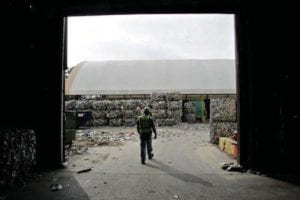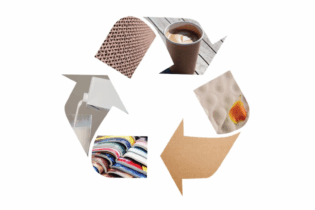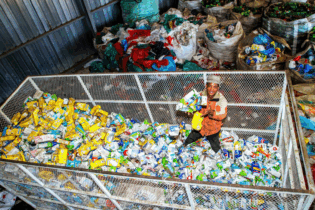Recent studies have revealed that South Africa boasts the second-highest plastics recycling rate in the world, with 18% of all virgin plastics produced in the country being processed for reuse. While the ranking is impressive, there is room for improvement, particularly within the local packaging industry.
Although the annual percentage of plastic recycled in South Africa is slowly increasing, the total amount of plastic that is not recycled is rising due to annual increases in the amount of the material being produced. As a result, South Africa still has a considerable way to go in tackling the current estimated total annual production of 1.3 million tonnes of virgin plastic. Johannesburg-based packaging solutions provider Damax Sebenza Pack operates from a 3 500 m2 manufacturing facility that specialises in the production of plastic packaging for numerous products, including food, cosmetics, gardening and industrial applications. The company processes 75 tonnes per month of a variety of plastics, including polyethylene terephthalate (PET), polyvinyl chloride (PVC), polypropylene and high impact polystyrene (HIPS), to satisfy industry specific requirements. Damax Sebenza Pack’s managing director, Brian Lovell, notes that PVC is particularly well recycled in the local industry, while PET is generally not. He does, however, highlight the fact that a high-profile retail client is currently driving a major initiative to use up to 30% recycled PET (R-PET) in its food and beverage packaging by 2014 – a move Damax Sebenza Pack fully supports. “PET is a non-toxic and hygienic material that is ideal for the storage of food and drinks. It is easily recyclable and, in addition to minimising environmental impact, R-PET is also considerably more cost effective than virgin material. This ultimately reduces the carbon footprint of the retailer, while passing on packaging savings to the end user in challenging economic conditions,” says Lovell.Another major environmental advantage of PET and PVC is the fact that the raw materials do not go to waste during production. Lovell adds: “One of the greatest advantages of these materials is that almost nothing goes to waste during the manufacturing process. The by-products from both materials are used in the manufacture of numerous items, ranging from pipes to fillers for shoes.”
Although PET is recyclable, he does admit that it is not biodegradable. “In the US, a polylactic acid polymer (PLA) bioplastic – manufactured from carbon found in simple plant sugars – has proven to be highly popular, as it is easy to mould and form. PLA is manufactured by NatureWorks, a US-based company jointly owned by Cargill and PTT Global Chemical. Lovell points out that the implementation of PLA in packaging locally is challenging, as it is almost double the price of other materials, with no local recycling facilities. In South Africa, plastics are either collected directly from homes and businesses, or they are extracted from municipal landfill sites, predominantly by informal waste pickers. The sorted plastic is then sold on to formal collectors who sort and bale the plastics before selling them to recycling companies for reprocessing. Lovell points out that organisations can help to improve plastic recycling rates in South Africa by separating waste at source and by purchasing recycled plastic products. “Even if there are no recycling companies nearby, waste can still be easily separated at source to ensure easy access for waste pickers, who are able to increase the efficiency of their collections, thereby increasing collected tonnages. This not only increases the earnings of the individual waste picker, but also the total amount of plastics being recycled,” he says. According to Lovell, the purchase of recycled products ensures sustainability, in addition to stimulating the plastic recycling process. “Packaging film such as wrapping, supermarket carrier bags and garbage bags amount to approximately one third of recycled plastic products in South Africa. By making the simple decision to consciously purchase everyday products that are manufactured from recycled plastic, individuals and companies can continue to play their role in ensuring that South Africa remains a world leader in plastic recycling,” he concludes.






